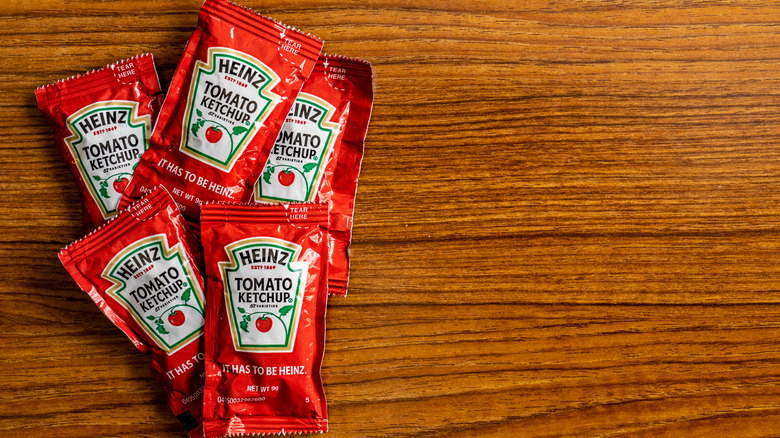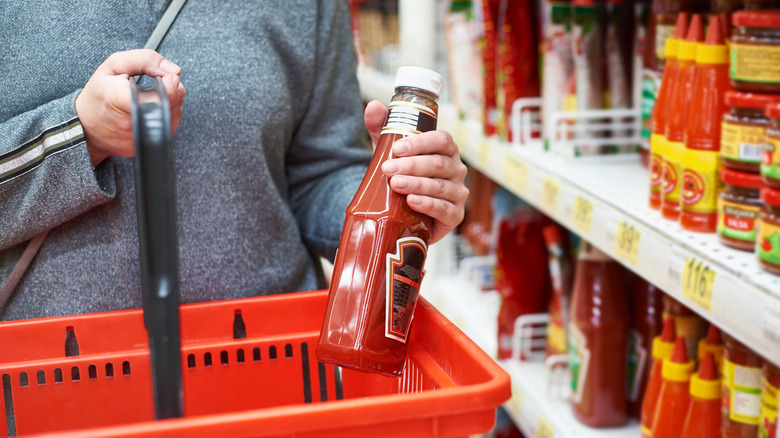How Long Can You Leave Ketchup Packets In Your Glove Box?
Whether served in a glass bottle or a little packet, ketchup has been a staple in the condiment industry for centuries. Some even consider it one of the first condiments, created from a particular fish spread in 300 B.C. in southern China, per History.com. In the 18th century, it was made from various foods, such as mussels, peaches, and mushrooms. It was even sold and used as a cure by Dr. John Cooke Bennet in 1834 for its nutritional values and antioxidants, according to Ripley's.
Today, ketchup is made with long-lasting ingredients, including vinegar and sugar, that work to increase its shelf life in ambient temperatures. These components also make it a great cleaning agent around the house or in vehicles. And, thanks to Dale Ross and Yale Kaplan (per Wilpack Packaging), we can now keep the beloved non-Newtonian sauce in individually sealed packets in the comfort of our own glove boxes. However, it's still important to keep tabs on your ketchup packets, whether for consumption or cleaning; they may not be as fresh as you think.
It doesn't go bad, but it doesn't stay good, either
Ketchup can last a long time. Lynne Galia, a spokesperson of Kraft Heinz, stated in an email to How Stuff Works that Heinz ketchup can last up to 9 months on the shelf without compromising its tomatoey taste. Though the condiment is still safe to consume past its "Best By" date, it definitely won't have the best flavor or consistency. But what about ketchup left in glove compartments, where extreme heat is present?
As we all know, cars can get very hot inside, even at room temperature. One Stanford University School of Medicine study revealed that 80% of temperature increases occur within the first 30 minutes of a locked car and can reach up to 40 degrees from its initial temperature. While hot ketchup won't necessarily make you sick, it certainly won't taste good. So, how can you tell if ketchup has gone bad? Start with sight — has it begun to separate? As reported by Eat by Date, you can generally tell when your ketchup is ready to be thrown out by its texture and color. As time passes, ketchup becomes much darker than its original color. It also thickens as the ingredients separate, creating a thin, liquid layer.
The FDA does not specify safety concerns regarding condiments in individual packets. Still, you may want to follow its dated guidelines to get the most benefit from your trusty ketchup packets.
Best By vs. Use By vs. Sell By
It can be quite confusing if you don't know the difference between the three. Will one make you sick if it is not consumed within the faded dates stamped onto the side? Or will it just not taste as good?
First, it is helpful to know that ketchup mainly consists of shelf-safe ingredients, so it lasts longer than other condiments might. But unfortunately, there is no "Sell By" or other time-limited label on individual ketchup packets, as it usually comes on the box they arrive in. So, for ketchup vigilantes who dare to live on the edge, your packets from 2006 may be well past their printed date.
However, for sauces made with perishable ingredients, such as eggs or dairy, the answer to "Best By," "Use By," and "Sell By" is actually quite simple to figure out. According to the USDA, "Best By" is the date the item tastes or appears at its finest; this does not indicate when the product expires. "Use By" is another date that does not indicate when a product will expire but states the advisable last day when the product is at its best. "Sell By" is a date for grocers to determine how long an item has been displayed, not an expiration date or cause for consumption concern. Eggs, for instance, are safe for three to five weeks past the "sell by" date, according to WebMD.


